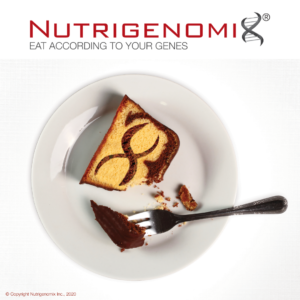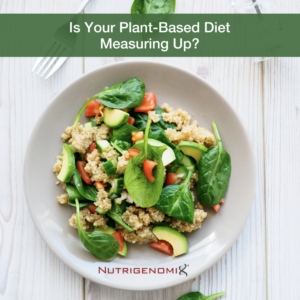There are a lot of opinions about the best way to eat – should you fast or snack? And what are the best eating habits according to your genes? Well, we have some answers for you. This blog post will explore the science behind food and eating habits and how they differ based on your genetic makeup. We will also discuss which type of eater you are and provide tips on following the best diet for your unique physiology!
Before we get started, let’s discuss what genetic testing can’t do – which is to predict if a person will develop a specific illness. Genetic testing can be a valuable tool in identifying genetic mutations or variants that can put people at an elevated risk for certain conditions, but it cannot definitively tell you whether or not you will get a disease.
Fortunately, gene testing provides an incredible opportunity: personalized nutrition.
By understanding your genetic makeup within nutrition-related categories such as carb metabolism and cravings, you can use gene testing to create a nutrition plan designed specifically for your body type and lifestyle.
Instead of relying on popular one-size-fits-all nutritional theories, which usually don’t consider individual differences, gene testing provides accurate guidance on what foods are best suited for keeping you healthy and energized.
So, let’s dig in!
WHAT ARE THE BEST EATING HABITS FOR YOUR GENES?
 Eating habits that benefit your genes provide your body with the right amount of nutrient-rich foods and minimize processed unhealthy foods. To ensure optimal genetic health, focus on incorporating plenty of vegetables, fruits, proteins, and healthy fats such as olive oil, avocados, legumes, fermented food, nuts and seeds into your daily diet. Eating a variety of antioxidant-rich coloured fruits and vegetables helps support healthy cell production and cellular repair, which is essential for overall genetic health.
Eating habits that benefit your genes provide your body with the right amount of nutrient-rich foods and minimize processed unhealthy foods. To ensure optimal genetic health, focus on incorporating plenty of vegetables, fruits, proteins, and healthy fats such as olive oil, avocados, legumes, fermented food, nuts and seeds into your daily diet. Eating a variety of antioxidant-rich coloured fruits and vegetables helps support healthy cell production and cellular repair, which is essential for overall genetic health.
Moreover, limiting added sugar as much as possible and avoiding refined grains not only cuts calories but also reduces inflammation in the body which can help prevent damage to our genes over time.
HOW CAN YOU DETERMINE WHAT YOUR GENES SAY ABOUT YOUR DIET AND HEALTH HABITS?
 With the advent of genetic testing, it has become possible to get a comprehensive picture of genetic markers’ effect on individual health and diet.
With the advent of genetic testing, it has become possible to get a comprehensive picture of genetic markers’ effect on individual health and diet.
Using a simple saliva sample or a swab from inside the cheek, you can gain insights into how your genes interact with lifestyle and environmental factors to inform what nutritional choices might be best for you.
This can help inform decisions about food options and dietary habits explicitly tailored to your needs, amplifying their health benefits, or reducing potentially harmful risks. With this knowledge, you can lead a healthier life in tune with your own gene expression.
WHAT SHOULD YOU DO IF YOU LEARN THAT YOUR GENES DICTATE A FAST METABOLISM OR A NEED FOR SNACKS THROUGHOUT THE DAY?
 Suppose you learn that your genes may dictate a fast metabolism or the need to snack more often than average. In that case, it can be challenging to understand how to maintain a healthy lifestyle.
Suppose you learn that your genes may dictate a fast metabolism or the need to snack more often than average. In that case, it can be challenging to understand how to maintain a healthy lifestyle.
To make sure you keep good nutrition and don’t overdo it with snacks, focusing on eating smaller portions throughout the day can be beneficial. It’s also important to pay attention to what types of snacks you choose; foods with plenty of nutrients, such as seeds, fruits, nuts, fermented dairy, and dark leafy greens, can satisfy hunger without sacrificing nutritional value.
Finally, being conscious of your total calorie intake and portions throughout the day is essential – if needed, mobile apps are available to help track the quantity and type of food consumed daily. With these strategies in mind, maintaining good health despite having a fast metabolism or needing extra snacks doesn’t have to become an additional burden.
HOW CAN YOU MAKE THE BEST OF YOUR GENETIC MAKEUP WHEN IT COMES TO EATING HABITS AND WEIGHT LOSS OR GAIN GOALS?
Making the best of your genetic makeup regarding eating habits and weight loss or gain goals can be challenging, but it is certainly achievable. The first step is identifying which genes influence food-related behaviours, such as digestion or cravings. With this understanding, you can adjust your diet with foods more compatible with your needs.
To ensure you reach your desired outcome, prioritize nutrient-dense foods over processed options and practice mindful eating.
Regular exercise and adequate rest will also help optimize physical health and well-being. These steps will help you reach your goals safely and soundly for your specific genetic makeup.
CONCLUSION
Ultimately, the perfect health and diet habits for your genes are unique to you. If you learn your genes allow or require broader dietary needs than average, don’t be discouraged—enjoy it! Considering your genetic makeup can be beneficial for achieving long-term health goals that keep you energized, nourished, and satisfied.
Remember to incorporate healthy food groups such as complex carbohydrates, lean proteins and various colourful fruits and vegetables while limiting vegetable oils, refined sugar, and grains to establish a well-balanced diet in tune with what your body needs.
With the right plan in place and consistent physical activity tailored to your individual strengths, it is possible to lead an incredibly fulfilled lifestyle in both body and mind.


